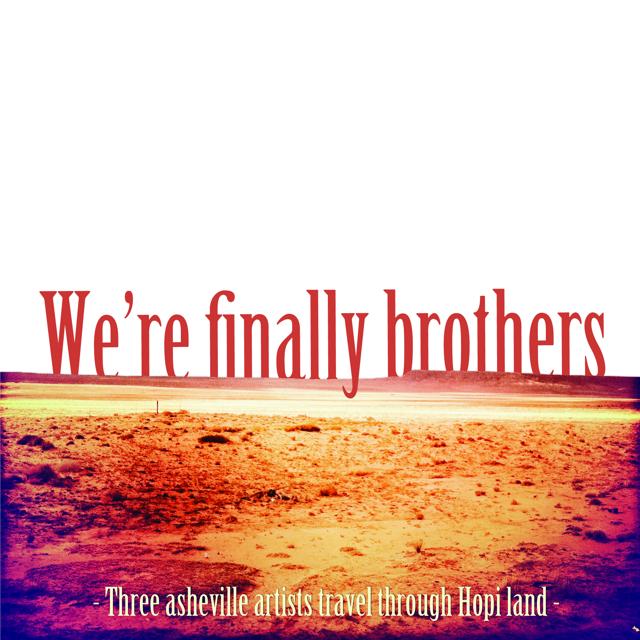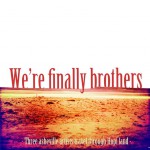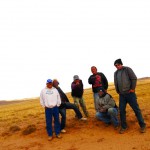Last fall, DeWayne B Love Barton, Imhotep Dlanod and Steve Mann — three men from Asheville — traveled together to the sovereign nation of the Hopi Tribe in northeastern Arizona. Dlanod is a Mardi Gras Indian and a native of New Orleans. He plays percussion with Sirius.B, Rising Appalachia and teaches youth through LEAF in Schools and Streets. Mann is a fine art, documentary, and commercial photographer and a native of Asheville. His work has focused on the Mardi Gras Indians of New Orleans, traditional Southern gospel singers and groups and portraiture. Barton was born in Asheville and raised in Washington, D.C. He is a found-objects artist, spoken-word poet and an organizer in the Burton Street Community, and is co-director of Green Opportunities. The following are excerpts of an interview conducted at Steve’s riverside studio with the three artists about their journey to Hopi Land.
JR: How did you first come to visit Hopi Land?
Mann: I first visited Hopi Land in 1987, on my first cross-country road trip. I had read in magazines about how much the Hopi loved reggae music, and I used to do a reggae radio show, so that fascinated me. When I got there I took a tour through the village of Walpi. The girl took me around the village, and I asked her what kind of music they listened to, and she said, “mostly reggae.” I told her that I did the radio show, and she said, “Well, you need to go see my sister’s boyfriend, he’s the one that promotes most of the shows.” So I just walked in to the tribal hall where he worked, and introduced myself to my friend Lefty. Merwin I guess is his real name — I don’t even know how to pronounce his last name — that’s why they call him Lefty. I always kept in touch with him after that. I moved out there, and I’d go out there to see dances, and reggae shows, and just hang out. It was just a different world. A completely different world.
Dlanod: My name is Imhotep Dlanod. I’m from New Orleans, La. I actually came here to North Carolina after Katrina, on the permission of Steve. Me and my friends from Zulu Connection [a New Orleans-based African dance company] were just traveling around the country, lost. We were lost human beings. Steve told us, anybody from Zulu Connection want to come to North Carolina and get back on your feet, come to my house. Houston, Atlanta, Augusta, Georgia … I said no. I didn’t want to stay in none of those places. I said, I’m gonna go to the mountains and heal myself. At the time, I didn’t know of Hopi. When Steve said, let’s take a trip to Hopi Land, I said, yeah, let’s go anywhere; relieve my mind of Katrina.
Barton: My name is DeWayne Barton. Steve asked me if I wanted to go [to Hopi Land]. Before Steve, I remember the first trip, when Tep [Imhotep] came back. Tep talked about Hopi Land a lot. It was nice to see something different and get a visual on that. When I was there looking up at the mountains, I was envisioning what it looked like far beyond, in the early days, the city being full, the flatlands full of food growing, and it was real powerful to get a sense of vision like that.
What were your impressions of Hopi culture?
Dlanod: We came up at night time. I was like, whoa, there’s lights in those mountains. There’s houses inside those mountains, people living in Mesas. That was an amazing sight to my eyes, people building houses in relationship to the mountain.
I went back to Tucson on Nov. 1 and paraded in the Day of the Dead parade, and it reminded me of New Orleans. I drove back up there by myself. Those people, when you go there, they have a credo. And they just act like that, they just live their credo. Everybody needs to find one and act like that.
Three years later, I went back up there. We walked in on a raindance. That was on top of the mesa, there’s 20 men, dressed in these costumes, and 10 other men came out. They were the Clown Kachina, who just made fun of everybody, including us. To see them actually praying for rain, and juxtaposition that to people coming and trying to stop me from worshiping, to try to mess it up, you see, the sacred and the secular is together. It was perfect. As the day came, a hurricane came and poured over the mesa. It was some magic. It rained until we got to California. And just to see those cornfields in such an arid place, where there’s no water … you can see that humanity has really lost something now, because the Hopi can grow corn in the desert. They have to weed, every day, and they pray. We need to go back to that kind of science. The Hopi, they showed that you can do it.
Mann: Because they chose that spot. They weren’t pushed there. They are on a reservation, but that’s where they were to begin with. They chose that spot, they had been other places that had water, and they chose not to stay there, because it was too easy. Their guides were telling them to live on Spirit. And that place would force them to do that. It wouldn’t be an option. If you’ve left that behind, you’re done. If you don’t have Spirit with you there, there’s nothing left for you.
Barton: Sitting around talking to people and seeing how no matter whose house you went into, you saw similar things about the culture or daily life. There’s no absence of culture. The thing about the dances, they had young people as a part of the ceremony. I don’t see us really getting young people, the future of the movement, the youth involvement, but out there they’re really trying to transfer the culture down. I noticed that the most valuable things was what people made, handmade by the mothers, the baskets, there’s a sense that they really value their own culture.
Mann: The amount of community involvement there is amazing. When Lefty got married, 12 or 13 years ago, it’s hard to describe the ceremony, it went on for weeks. His side of the family brought animals, goats and sheep and cows, and her side of the family brought other foodstuffs. And I’m not talking about a table full of food. I’m talking about pickup trucks full, bumper to bumper, lined down to the bottom the mesa. And all the food from her side got re-distributed to his side of the family, and all the meat was shared among her clan.
[to Mann] Do you see yourself as a participant or an observer in the cultures that you photograph?
Mann: When I first started out, as an artist, I saw myself more as a witness to it, if I was somewhere away from home. The deeper I’ve gotten into, it, especially in New Orleans, you know, I’m not just photographing the Indians, or the parades, I’m photographing their weddings, and their portraits, and anything they need me to do. In that way, I’ve felt like a little more of a participant. It seems like snapshots are more important to most people than “fine art,” I don’t know where that’s going to lead me, but I’ve noticed the pictures that mean the most to people, I know it seems a little odd, but at funerals, pictures I’ve taken that didn’t seem to be very significant, suddenly become very significant to the family. Hopi Land is tricky for a photographer, because you are not allowed to photograph in the villages. So it’s more just forgetting about the camera, when I’m out there, which is kind of nice.
[to Dlanod] Are there parallels between Hopi and New Orleans Mardi Gras Indian Culture?
Dlanod: It’s definitely the same thing. I mean everything has an origin. It’s the same thing. If you go to their houses in Hopi Land, and they’re having a festival, they’re feeding everybody. And if you go now, to New Orleans, everybody, from the babies to the elders, getting ready for the festival. They feeding everybody after the marches. When I went to the Hopi for the first time, I was like, ‘Wow, this is where I come from!’ The Indians used to march to Louisiana for the festival. That festival goes on in Brazil, Trinidad/Tobago, at the same time. Not because of the Mardi Gras, because of the celebrations of the stars, same thing the Hopi are doing at the same time! Everything has the same origin.
What can communities do to maintain cultural integrity?
Barton: I sense that the disconnect [of Western culture] is trying to infiltrate [Hopi] culture, slowly but surely. I could sense that they were trying to protect it and keep it at bay. But they’ve got a long line of years of practice of maintaining their culture. But for communities that don’t have that experience, they can get overwhelmed.
It’s about creating culture where you are, and cultural exchange. I feel fortunate that people opened their doors to me being there in Hopi Land. I felt that it was ordained that I would be going there. I feel that we could do more to share who we are. And spend less time criticizing different cultures or each other for our differences.
Dlanod: I’m trying to represent New Orleans. We as artists, the biggest thing is to keep culture alive. The biggest thing about New Orleans, or even Hopi, is do not take culture away from people. See, they tried to wipe out a culture of people. So I say, I’m gonna go take this culture, and bring it to everybody. You gonna be drowning New Orleans? Now it’s gonna spread through the whole planet. Everybody gonna get it now. You done messed up now. Somebody survived. So now everybody’s gonna get a piece of this culture.
Thanks so much for meeting with me today. Seems like your trip was a pretty powerful experience.
Dlanod: A rite of passage.
Barton: I remember, when we first got to Hopi Land, we were sitting in this room with a bunch of guys, Lefty and his friends. And a lot of the things we were talking about, where we was from, we were sharing. It was all guys, all men, sharing, philosophizing! I felt that was a real special time.
Dlanod: They asked us what we thought of their culture; it was the intro. We shared for a couple of hours, and we agreed that what we all was doing was the right thing. It was like, we’re finally brothers. So that was real. It was a rite of passage.
— Jodi Rhoden is the owner of Short Street Cakes in West Asheville and a writer focusing on Southern food and culture. She can be reached at jodi@shortstreetcakes.com.







Before you comment
The comments section is here to provide a platform for civil dialogue on the issues we face together as a local community. Xpress is committed to offering this platform for all voices, but when the tone of the discussion gets nasty or strays off topic, we believe many people choose not to participate. Xpress editors are determined to moderate comments to ensure a constructive interchange is maintained. All comments judged not to be in keeping with the spirit of civil discourse will be removed and repeat violators will be banned. See here for our terms of service. Thank you for being part of this effort to promote respectful discussion.